 MyDogBreeds
MyDogBreeds Labrador Husky is originated from Canada but Kanni is originated from India. Both Labrador Husky and Kanni are having almost same height. Labrador Husky may weigh 23 kg / 51 pounds more than Kanni. Labrador Husky may live 3 years less than Kanni. Both Labrador Husky and Kanni has almost same litter size. Labrador Husky requires Moderate maintenance. But Kanni requires Low maintenance
Labrador Husky is originated from Canada but Kanni is originated from India. Both Labrador Husky and Kanni are having almost same height. Labrador Husky may weigh 23 kg / 51 pounds more than Kanni. Labrador Husky may live 3 years less than Kanni. Both Labrador Husky and Kanni has almost same litter size. Labrador Husky requires Moderate maintenance. But Kanni requires Low maintenance
 The Labrador Husky is a purebred, spitz-type dog which looks much like a Wolf. People think because it has the name Labrador Husky it is a cross between a Husky and Labrador. What it essentially means is that it is a Husky dog which comes from the region of Labrador, Canada.
The Labrador Husky is a purebred, spitz-type dog which looks much like a Wolf. People think because it has the name Labrador Husky it is a cross between a Husky and Labrador. What it essentially means is that it is a Husky dog which comes from the region of Labrador, Canada.
It is a fairly unknown breed, but it is strongly believed that the dog was developed in Labrador, a region of northern Canada. In fact this is where the dog got its name from.
The attractive dog was used for sledding and it is also thought that the people of Labrador introduced Alaskan Malamute and German Shepherd in to add in some additional skills from these two dog breeds. The dogs were later domesticated so as to become companion animals.
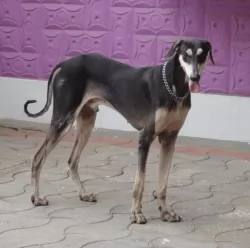 The Kanni dog is a rare South Indian Sighthound. It is also known as the Maiden's Beastmaster and this is because it is known to be protector and defender of its owner's property.
The Kanni dog is a rare South Indian Sighthound. It is also known as the Maiden's Beastmaster and this is because it is known to be protector and defender of its owner's property.
During ancient times, the dog was used for hunting but today it is essentially kept as a pet and it is registered with the Kennel Club of India.
 The wolf-like muscular Labrador Husky is a large dog standing at 51 to 71 cm in height and weighing 27 to 45 kg.
The wolf-like muscular Labrador Husky is a large dog standing at 51 to 71 cm in height and weighing 27 to 45 kg.
Labrador is a place known for its icy winters and the dog’s double coat protects it from the freezing temperatures.
The color of the coat can be white, grey and white, solid black, solid grey as well as red and white. In fact there can be several different coat colors in one litter.
He has a long muzzle like the wolf and blue or brown slanted eyes. Sometimes you’ll get one blue eye and one brown eye. He has pointed ears, a nose which can be black or a pinkish color, bushy tail and paws which are webbed.
Labrador Huskies make wonderful pets and they are good with children, particularly when they’ve been properly trained and socialized.
Because they are dogs which have worked in a pack, they also get on well with other dogs in the home. You’ll notice that your Labrador Husky won’t often bark but he will howl like a wolf.
He is a friendly dog and not aggressive. He is intelligent too and you can teach him some basic commands such as sit, stay and lie-down.
The Labrador Husky is a dog used to having a job so if you bring him into your home, you’ll need to ensure that you set aside time to exercise him as he will become frustrated and bored if he isn’t involved in your family life.
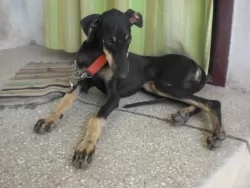 These dogs are tall, slim and deep chested, coming in two-color combinations, but it is the black and tan variety that is the true Kanni. There is also a cream variety. There are other color variations and each color has a unique name connected to it. The coat of the Kanni is short and smooth.
These dogs are tall, slim and deep chested, coming in two-color combinations, but it is the black and tan variety that is the true Kanni. There is also a cream variety. There are other color variations and each color has a unique name connected to it. The coat of the Kanni is short and smooth.
They are medium sized dogs standing at 62 to 67cm at the withers and weighing in the region of 18 – 22kg. When you first look at these dogs you might think of them as being similar to a Greyhound in looks. This is also because of their lean, muscular looks.
The eyes are a golden color, the nose black and the ears are a medium size and floppy with the long tail being semi-curved.
The Kanni has always been a hunting dog so he is used to being sharp, strong-willed, independent and alert as well as having some aggressive tendencies. It is also quite a reserved dog but he shows love and loyalty to his owner. He is independent and easy to train. It is a good thing to have him trained and socialized so that he is obedient to the simple commands you give him.
 A Labrador Husky is a loyal, affectionate dog who is capable of forming a strong bond with his human family.
A Labrador Husky is a loyal, affectionate dog who is capable of forming a strong bond with his human family.
As a working dog, he loves being busy with fun and games and is playful and energetic and has good looks on his side too.
He is also an intelligent dog, strong-willed and confident and will require a firm, consistent owner who understands his need for regular exercise.
Social, lively and robust, the right environment will bring out all this beautiful dog’s best characteristics.
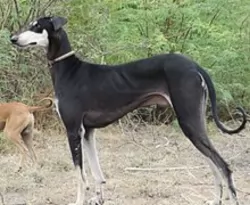 The Kanni looks much like your regular Doberman Pinscher but he has long tail and floppy ears. He is slim and agile but also powerful being able to have bursts of speed. It is why he requires a large place to run and play in, being better suited to a home with a large garden or farm.
The Kanni looks much like your regular Doberman Pinscher but he has long tail and floppy ears. He is slim and agile but also powerful being able to have bursts of speed. It is why he requires a large place to run and play in, being better suited to a home with a large garden or farm.
He is a playful, quiet dog but he has quite a bark on him and is known to be a good watchdog because of this. He is a protective dog too, devoted and loyal and making a splendid family pet.
 Labrador Huskies can live to be between 10 and 13 years of age, and within a loving home he is generally looked upon as a healthy breed.
Labrador Huskies can live to be between 10 and 13 years of age, and within a loving home he is generally looked upon as a healthy breed.
There are always typical dog problems that might be found in your dog, and a couple of the more prominent ones are listed -
It can be a sad day for your Labrador Husky if he is diagnosed with hip dysplasia because if he is still used as a pack dog for pulling sleds it could well put him out of a job that he thrives on. It is a problem in the hips, and your once active dog may be in pain and may even battle to stand up after lying down.
He could even develop arthritis which can cripple him. He’ll need to get to the vet so that treatment can make life comfortable for him and to assist with pain.
Deep chested dogs are more prone to bloat, and your Labrador Husky is a deep chested dog. The stomach of the dog expands with gas, blocking gas escaping and putting pressure on the abdominal organs of the dog.
In some cases the stomach can twist and then immediate surgery will be required. This is a life threatening illness. Try and avoid feeding your dog one large meal and feed him smaller meals instead. These days you also get feeding bowls that encourage slower eating.
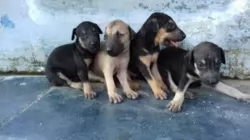 Not much is known about inherited health problems in this breed, and he can live up to a ripe old age of 16. It seems a pretty healthy dog, but still it helps to be aware of some of the more common dog illnesses that your pet can succumb to.
Not much is known about inherited health problems in this breed, and he can live up to a ripe old age of 16. It seems a pretty healthy dog, but still it helps to be aware of some of the more common dog illnesses that your pet can succumb to.
For first time dog owners it can be difficult knowing what health problems our beloved pets could suffer from. Every dog breed has certain diseases to which they are more prone to, but these are some common issues that most of our 4-legged friends will face -
This is a common dog health problem in India with the Kanni. There are so many things that disagree with their digestion. Most dogs may not want to eat their next meal, but when he is lethargic, he is hot and is vomiting, it is time to get your pet to the vet. This is because diarrhea causes rapid dehydration in dogs. To avoid diarrhea, steer clear of certain foods such as milk and dairy products as well as old, spoiled fatty foods. With diarrhea your dog must always have access to fresh, cool water.
This is a common dog disease, and ear infections can be painful and frustrating for your pet. He’ll scratch at his ear, shake his head and the inside of the ear may be red with a discharge. Check his ears for redness and try to keep them free from wax build up and dust.
Cleaning the ear is quite simple, and if you’re not sure how, the vet can do it quickly and effectively. Usually some dog ear cleaning solution on some cotton wool can do the trick. Ear infections are common in dogs like the Kanni with floppy ears.
It is essential to control fleas on your dog from word go. Fleas thrive in warm temperature and humidity and your pet will scratch, bite and lick at the spot. When you brush your pet, look through his fur for fleas and tell you vet about it if you discover ticks and fleas. A topical ointment could nip the problem in the bud. You may want to consider a flea collar for your pet.
Tapeworms, hookworms and roundworms for instance are commonly found in dogs, and even for healthy dogs, deworming tablets should be given from time to time. If your dog has worms, you’ll notice lethargy, loss of appetite, diarrhea and vomiting. It may be time to get your pet to the vet.
 You’ll want to introduce a proper grooming routine for your pet as he has a thick double coat and he sheds throughout the year. Brush the thick coat 2 or 3 times a week, and set aside time to check for fleas and ticks and any appearance of lumps.
You’ll want to introduce a proper grooming routine for your pet as he has a thick double coat and he sheds throughout the year. Brush the thick coat 2 or 3 times a week, and set aside time to check for fleas and ticks and any appearance of lumps.
These are dogs which require a lot of vigorous exercise. Left chained or ignored he can become frustrated, run-down, bored and sick. He is a living, social animal that should only be brought into a household that acts responsibly towards him.
Choose high quality food which is for high energy dogs. If you give him dry kibble, mix in some home-made food occasionally to add variety, and also try to include some raw meat from time to time. Always ensure fresh, cool water is available.
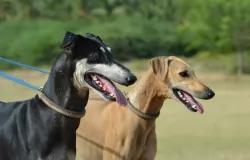 The Kanni is a low maintenance dog with his short coat. You can give him a good brush twice a week, check that his nails don't grow too long and also check his ears inside and out. Ticks and fleas are rife in hot weather and you want to give your dog a thorough check for these. You should also be checking your dog's teeth and brushing them 2 or 3 times a week. Dental problems can cause havoc with your dog's health.
The Kanni is a low maintenance dog with his short coat. You can give him a good brush twice a week, check that his nails don't grow too long and also check his ears inside and out. Ticks and fleas are rife in hot weather and you want to give your dog a thorough check for these. You should also be checking your dog's teeth and brushing them 2 or 3 times a week. Dental problems can cause havoc with your dog's health.
As a hunting breed, the Kanni is used to running so his needs for a good amount of exercise are quite high. While they do make good family pets, they hanker after wide open spaces and being busy. If you own one of these dogs, make sure that you exercise him often because otherwise he becomes frustrated and unhappy.
This dog has always been used to village life where he is free to roam wide open spaces. He is much more suited to country life than to city life, and as a pet, you will need to ensure that he receives a good amount of exercise.
Take him for walks, and if he's been socialized and trained, take him to the park and allow him off his leash to run.
The dog has always been fed traditional food such as porridge and milk but we know better now that dogs need protein too as well as a diet rich in vitamins and minerals to ensure his health.
You can feed him a top quality commercially manufactured dog food and add in some cooked chicken, rice and vegetables from time to time. It is expensive, but if you can, try and add in some raw meat occasionally as well. Your Kanni dog must always have access to fresh, clean water.